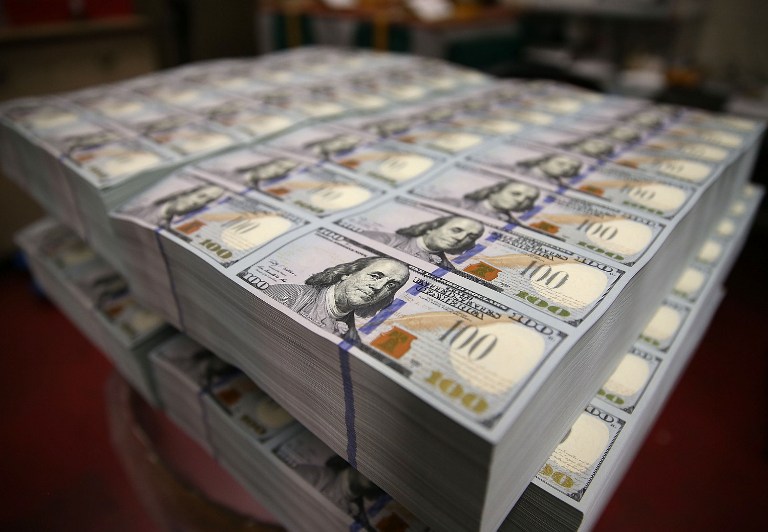The Fed effect reverberated through global markets, pushing the dollar up and commodities down as traders increased bets on higher borrowing costs in the world’s largest economy.
The dollar climbed against all of its major peers, while global stocks were set for the longest slide since June after hawkish comments from Federal Reserve officials last week. Oil slumped below $47 a barrel as metals retreated. The S&P 500 Index advanced after a report showing further improvement in consumer purchases underscored the strength of the U.S. economy. Treasury yields retreated after Friday’s surge. Japanese shares led gains among the world’s biggest equity markets after central bank chief Haruhiko Kuroda reiterated a pledge to boost monetary stimulus if needed.
Almost unthinkable two months ago, the prospect of a rate increase next month is now back on the table, with the probability rising to 42 percent from 24 percent in the space of a week. Fed Chair Janet Yellen said Friday in Jackson Hole the case for an increase is getting stronger, while Vice Chairman Stanley Fischer indicated a tightening is possible at the next review. Those comments will sharpen the focus on Friday’s monthly U.S. payrolls report to gauge whether the economy is strong enough to sustain higher borrowing costs.
“If they manage to raise rates that will be relatively good news but it does entail a little bit more tightening in the system,” said Samy Chaar, a Geneva-based strategist at Lombard Odier, which manages about $170 billion.
A report on Monday showed American consumers boosted spending for a fourth month in July, bolstered by stronger income gains, sending the biggest part of the U.S. economy to a solid third-quarter start. The 0.3 percent rise matched forecasts and followed a 0.5 percent increase the prior month that was revised up, Commerce Department data showed. Incomes rose 0.4 percent, the most in three months. Payrolls data on Friday are forecast to show 180,000 jobs were added in August, according to economists.
Stocks
The S&P 500 rose 0.1 percent at 9:30 a.m. in New York.
The Stoxx Europe 600 Index retreated 0.3 percent. A gauge of auto makers posted the biggest decline, while sliding oil prices dragged energy producers lower. The volume of shares changing hands today was 70 percent lower than the 30-day average as U.K. markets were closed for a holiday.
The MSCI Emerging Markets Index fell 0.8 percent as almost two stocks declined for every one that advanced.
Fischer reiterated in an interview on CNBC that the possibility exists for two rate increases this year, starting as soon as September.
“The market has realized that the Fed meant it when it said two hikes are possible this year, repricing the September Fed hike chance,” said Aurelija Augulyte, a strategist at Nordea Markets in Copenhagen. It’s negative for “dollar-financing needs and puts pressure on commodity prices and hence, emerging-market exports,” she said.
Japanese stocks advanced as a weaker yen boosted the outlook for exporters. The Topix index climbed 2 percent as Toyota Motor Corp. and Mazda Motor Corp. jumped at least 3.9 percent.
Currencies
The Bloomberg Dollar Spot Index gained 0.3 percent, after surging 0.8 percent on Friday. The yen fell 0.4 percent, after sliding 1.3 percent in the last session, and the euro fell to a two-week low. The pound weakened 0.5 percent.
The MSCI Emerging Markets Currency Index fell 0.8 percent, with South Korea’s won sliding 1 percent. Most of the central banks that are tracked by Bloomberg in both Asia and Europe have cut interest rates this year.
South Africa’s rand weakened 1.1 percent, after a 5.9 percent weekly loss. The currency posted its steepest slide of the year last week on concern that a stand-off between South African Finance Minister Pravin Gordhan and the country’s police could lead to Gordhan’s ouster.
Commodities
The Bloomberg Commodity Index, which measures returns on raw materials is down a fourth day, trimming a monthly advance as oil and precious metals fell.
West Texas Intermediate crude slid 1.4 percent to $46.98 a barrel amid doubts producers will agree on a deal to stabilize the market when suppliers meet next month for informal talks. A similar proposal was made in February, but a meeting in April ended with no final accord.
“The likelihood of them actually agreeing to some kind of production freeze is relatively low,” Daniel Hynes, a senior commodity strategist at Australia & New Zealand Banking Group Ltd. in Sydney, said in a Bloomberg television interview.
Gold extended its longest losing run since May to a 7th day, falling as much as 0.5 percent after losing 1.5 percent last week. Silver touched the lowest price in almost two months.
Bonds
Germany’s benchmark 10-year bond yield increased as much as four basis points to minus 0.035 percent, before being one basis point higher at minus 0.06 percent. The yield on similar-maturity French bonds was one basis point higher at 0.178 percent, having jumped earlier by four basis points.
Euro-area bonds are also coming under pressure with Spain’s acting Prime Minister Mariano Rajoy set to face a confidence vote Tuesday, and governments set to reissue debt after a summer lull that saw Germany the sole issuer last week. Countries in the region may sell about 30 billion euros ($34 billion) this week, according to Commerzbank AG.
“We treat the market rather defensively over the coming days and weeks” partly due to “heavy supply and Fed repricing,” Ciaran O’Hagan, head of European rates strategy at Societe Generale SA in Paris, wrote in a client note.
The yield on 10-year Treasuries fell three basis point to 1.60 percent, after jumping six basis points to a two-month high in the last session. Fed funds futures showed there is a 65 percent chance that Yellen will raise interest rates by year-end.


 Billionaire Watch4 weeks ago
Billionaire Watch4 weeks ago


 Naira4 weeks ago
Naira4 weeks ago


 Naira3 weeks ago
Naira3 weeks ago




 Naira3 weeks ago
Naira3 weeks ago




 Naira3 weeks ago
Naira3 weeks ago




 Naira2 weeks ago
Naira2 weeks ago
 Commodities3 weeks ago
Commodities3 weeks ago


 Sport Business4 weeks ago
Sport Business4 weeks ago



















